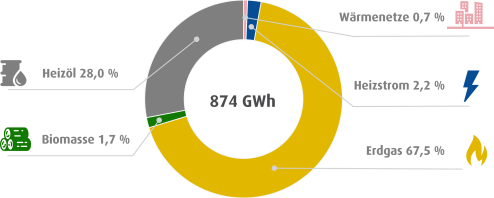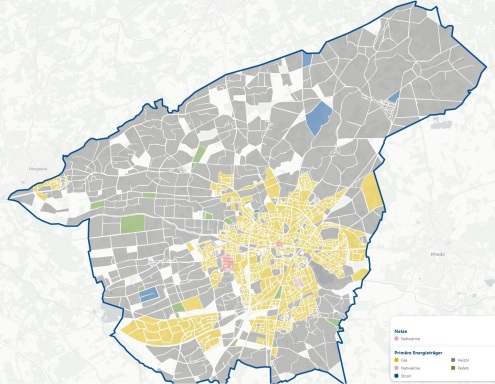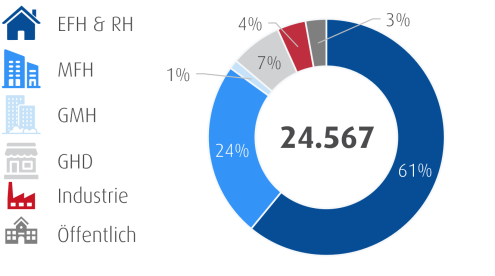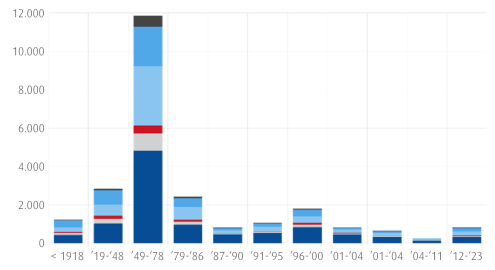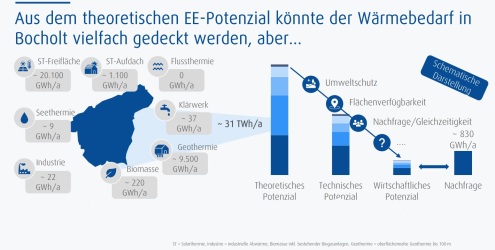Municipal heat planning
Special offer: on-site energy advice
Your chance for a future-proof home
Municipal heat planning as a path to the heat transition has been decided - and it starts right in your home.
In order to reduce energy costs and at the same time strengthen climate protection in Bocholt, the city of Bocholt, together with the NRW consumer advice centre and the Borken district, is launching this special campaign "Energy advice on site".
Why is the advice worthwhile?
Older properties often consume more energy than necessary. With targeted refurbishment, you can:
- Reduce your energy costs in the long term,
- increase living comfort,
- benefit from state subsidies,
- and make an important contribution to climate protection.
What can you expect?
An experienced energy consultant will come directly to your home and take a close look at your building in a 90-minute tour:
- The building envelope and building services are analysed.
- You will receive a written report with personalised recommendations.
- You will receive information on funding opportunities for refurbishment measures.
- If required, you will receive advice on renewable energies, energy performance certificates and heat insulation measures.
Costs & funding
- Participation fee: 40 euros per consultation
- The first 20 households will be reimbursed the fee upon presentation of the receipt!
Period & registration
The consultations will take place from 29 September to 12 December 2025.
Registration is required and possible between 15 September and 1 November 2025:
✉️ Email: klimaschutz(at)bocholt(dot)de
📞 Telephone: 02871 953-3002
Registrations received before 15 September 2025 will not be considered!
Your advantage at a glance
- Individual analysis directly on site
- Concrete recommendations for action
- Tips on funding programmes
- Financial relief & climate protection
👉 Register now and make your home fit for the future!
On the way to a greenhouse gas-neutral heat supply

© Envato.com
The Heat Planning Act obliges local authorities to draw up a municipal heat plan, an important planning process for a greenhouse gas-neutral, efficient heat supply. This is an informal planning process that provides a strategic basis for further implementation measures towards climate neutrality.
The heat planning gives the city the opportunity to develop a strategy for the transformation of the heat supply in the form of an initial municipal master plan . The aim is to develop recommendations for a greenhouse gas-neutral and sustainable heat supply and actively shape the heat transition. The "municipal heat planning" does not yet have any external impact on the individual property owners.
Municipal heat planning adopted!
On 10 July 2025, the draft of the municipal heating plan was unanimously adopted by the municipal council. (see item 12 on the agenda)
Draft of the municipal heat planning
Municipal heating planning pursues several important goals:
- Increasing energy efficiency:
The use of modern technology and optimised processes should reduce the energy consumption of the heat supply. - Promoting renewable energies:
The use of renewable energy sources is to be increased in order to reduce CO2 emissions. - Securing the heat supply:
The focus is on a stable and affordable heat supply for all citizens. - Categorisation into prospective heat supply areas:
Different areas of the municipality are divided according to their likely future heat supply type (e.g. centralised, decentralised supply) and shown in the heat plan.
The inventory analysis describes the status quo of the heat supply in the city of Bocholt. It forms the basis for the model-based extrapolation of the development of Bocholt's heating market planned in the next step. For this purpose, all relevant data on
- the current heat demand or heat consumption within the planned area, including the energy sources used for this,
- the existing heat generation plants and
- the energy infrastructure facilities relevant to the heat supply were
collected, evaluated and visualised.
The final energy and heat demand in Bocholt are structured quite identically in the status quo. The heat demand is approx. 90 % of the final energy demand. This key figure provides information on the energy efficiency of all heating systems used in Bocholt. More than 98% of the final energy demand is covered by fossil fuels, predominantly natural gas. This becomes clear in the CO2 balance.
Bocholt has an annual final energy demand for heat totalling 873 GWh. In relation to the number of inhabitants, this corresponds to around 11,000 kWh per inhabitant. The final energy requirement is therefore well below the national average of a good 17,000 kWh per inhabitant. The resulting heat requirement is 800 GWh/a (approx. 90 %).
Residential buildings account for the majority of energy consumption: around 63 % of final energy demand is attributable to this sector. Industry and commerce share the remaining 37 %.
Around 24,500 buildings are heated in Bocholt, of which more than 90 % are residential buildings. The remaining buildings include commercial, industrial and public buildings, which also make a significant contribution to energy consumption. The stock of residential buildings is relatively old and mostly still partially or unrenovated. With an average value of 120 kWh/m²/a, the energy efficiency of these buildings corresponds exactly to the West German average.
A complete energy refurbishment of residential buildings would offer considerable savings potential: Up to 220 GWh could be saved annually if all buildings in the city were fully refurbished and a medium refurbishment depth was achieved. Such an average renovation depth takes into account that the predominantly old buildings (more than 50 % were built before 1979) cannot be upgraded to a KfW standard 40 or 55.
A complete refurbishment of all buildings in Bocholt is associated with considerable challenges, such as high investment costs and associated high financial requirements, an inhomogeneous ownership structure, logistical complexity and a high demand for qualified specialists. In addition to the lack of a legal obligation, these factors make it difficult to realise a complete refurbishment of the entire building stock.
The remaining final energy demand of 870 GWh/a minus the energy efficiency potential through refurbishment must be covered by renewable energies (RE) or unavoidable industrial waste heat.
The theoretical potential for renewable energy and waste heat in Bocholt is an impressive 31 TWh per year. This potential exceeds the current final energy demand of 873 GWh many times over and demonstrates the possibilities of a sustainable energy supply. Industry in Bocholt has expressed great interest in feeding its waste heat potential of 22 GWh per year into heating networks. It makes sense to investigate the feasibility of such heating networks in more detail, as potential challenges such as land availability, investment costs and financing, technological requirements and logistical obstacles must be taken into account.
The figures illustrate the enormous potential that Bocholt can utilise by renovating buildings to make them more energy efficient and using renewable energies. The realisation of the transformation requires careful planning. The foundations are to be laid in the next steps of the heat planning process.
Target scenario
According to the Heat Planning Act, a target scenario should describe the long-term development of the heat supply for the planning area as a whole. The target scenario is outlined using certain indicators and must guarantee a decarbonised heat supply by 2045 at the latest.
A wide range of development variants were calculated on the basis of the existing and potential analyses. From a variant in which no measures are taken by the city of Bocholt to a variant in which the climate protection target of greenhouse gas neutrality is already achieved in 2040, over 15 different simulations were carried out. A scenario was also explicitly calculated that envisages the availability of hydrogen from 2034.
The target scenario was then developed from the different variants, which represents the most likely development variant in conjunction with appropriate measures. This was based on parameters such as the emission factors of the various energy sources, an increase in the refurbishment rate from 0.8 to 1.6 %, various heating technologies and developments in energy source prices.
In this target scenario, two further heating networks could be created in Bocholt - one in Liedern and one in the i-Park Mussum. In addition, the heating networks at Europaplatz and in the area of the Fildekenbad and the comprehensive school could be expanded.
The target scenario shows that the heating requirement will only decrease by around 10 % despite an increased refurbishment rate. However, the final energy demand required for this heat supply is reduced by more than half. By switching from heating systems with predominantly fossil fuels to predominantly electricity-based systems (heat pumps) with a higher degree of efficiency, the heating transition in Bocholt can be achieved.
The aim of municipal heating planning is to identify areas that are more likely to be suitable for heating networks, i.e. for the economic construction or expansion of such networks. The following types of area were identified for Bocholt:
- Heating network densification areas in which additional households could be connected to an existing network,
- Heating network expansion areas, where existing network structures can be expanded and
- New heating network construction areas in which a new heating network can be developed if necessary
- Decentralised heat supply - heating networks are unlikely here
However, the area categorisation shown does not yet represent an area designation in accordance with Section 26 of the Heat Planning Act, as there are no concrete plans or investment decisions regarding the construction of possible heating networks. The plans therefore remain non-binding. For a possible realisation, it is necessary that these heating network areas are substantiated with feasibility studies.









